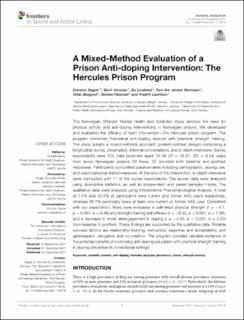A Mixed-Method Evaluation of a Prison Anti-doping Intervention: The Hercules Prison Program
Sagoe, Dominic; Berit, Johnsen; Lindblad, Bo; Norman, Tom Are Jensen; Skogvoll, Vidar; Heierdal, Morten; Lauritzen, Fredrik
Journal article, Peer reviewed
Published version

Åpne
Permanent lenke
https://hdl.handle.net/11250/2976294Utgivelsesdato
2021Metadata
Vis full innførselSamlinger
Sammendrag
The Norwegian Offender Mental Health and Addiction study denotes the need for physical activity and anti-doping interventions in Norwegian prisons. We developed and evaluated the efficacy of such intervention—the Hercules prison program. The program combines theoretical anti-doping lessons with practical strength training. The study adopts a mixed-methods approach (pretest-posttest design) comprising a longitudinal survey, observation, informal conversations, and in-depth interviews. Survey respondents were 104 male prisoners aged 18–56 (M = 34.81, SD = 9.34) years from seven Norwegian prisons. Of these, 52 provided both baseline and posttest responses. Participants completed questionnaires including demographic, doping use, and psychophysical items/measures. At the end of the intervention, in-depth interviews were conducted with 11 of the survey respondents. The survey data were analyzed using descriptive statistics, as well as independent and paired samples t-tests. The qualitative data were analyzed using Interpretative Phenomenological Analysis. A total of 7.5% and 33.3% of participants were current and former AAS users respectively, whereas 86.1% personally knew at least one current or former AAS user. Consistent with our expectation, there were increases in self-rated physical strength (t = −4.1, p < 0.001, d = 0.46) and strength training self-efficacy (t = −8.33, p < 0.001, d = 1.36), and a decrease in moral disengagement in doping (t = −4.05, p < 0.001, d = 0.52) from baseline to posttest. These findings are supported by the qualitative data. Notable success factors are relationship-building, instructors' expertise and acceptability, and gatekeepers' navigation and co-creation. The program provides valuable evidence of the potential benefits of combining anti-doping education with practical strength training in doping prevention in correctional settings.
